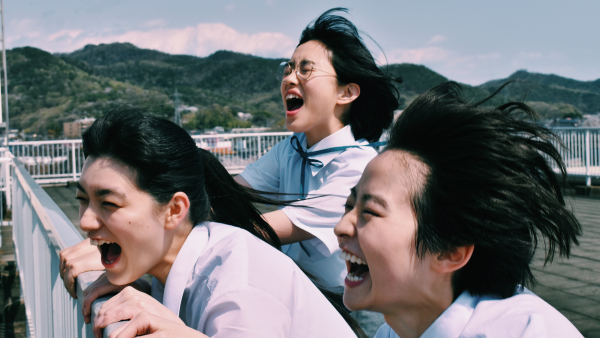
Films have a power to transport audiences, to invite them to faraway places and ideas they’ve never visited and may never have the chance to see. They may be real or imagined, but the impact of any film comes from its ability to draw in viewers and to present a compelling escape. Auteurs and genres have loyal, devoted fans who have screened their work hundreds of times and memorized every line and shot, idolizing the way that they approach filmmaking. Those who really love film strive to create something worthy of comparison, which is exactly what one teenager sets out to do in the charming It’s a Summer Film.
Barefoot (Ito Marika) is a driven and excitable student who practically lives on samurai films, screening and quoting them endlessly. She jumps at the chance to make an epic of her own, but finds her project overshadowed by another student, Karin (Mahiru Coda), who is granted the funds from her school’s film club to shoot her film instead. Barefoot is relentless and determined, and she decides to make her movie, Samurai Spring, however she can. Among the many people she willingly and unwillingly enlists is Rintaro (Daichi Kaneko), a new student who is actually from the future.

One part of this film is perfectly normative and representative of youthful overenthusiasm in any place. Barefoot is indeed talented and has a vision, but she also doesn’t have the technology or professionals available to assemble a big-budget masterpiece. But she does have the drive, and convincing enough of her friends, classmates, and those she thinks would be good for particular roles to participate serves as her ticket to try to achieve her dream. The focus on samurai films grounds this project geographically, if only for the near-universal affinity for the genre that might not exist everywhere.
But what takes this film away from reality – in a positive way – is the character of Rintaro, who shares the grim message that he comes from a time when films are incredibly short and then disappear. That news is foreboding and horrific for Barefoot, and the tragic revelation serves to inspire her more, as if nothing could be more important than her finishing her film so that it can have whatever impact it must. She’s the Obi-Wan Kenobi to Rintaro’s Princess Leia, to put it in iconic cinema terms that might serve as the American equivalent of the Japanese movies that power Barefoot’s imagination.

This film is hardly a typical teenage story, though it does feature a sense from its main characters that this is everything, that they must achieve what they desire with a degree of immediacy, especially given the prescient message from the future that details a reality they will not soon want to meet. Barefoot is a powerhouse, someone who through sheer will and perseverance manages to pull off a production that, even if it may not meet the highest filmmaking standards, involves active, participatory people in all roles working to create something enduring.
As with any film about the making of a film, seeing the finished product is the ultimate payoff usually reserved for the final scene. This one plays off its lead character and delivers a conclusion that absolutely does justice to the time and energy Barefoot has poured into this, giving her the ending that she and this film-within-a-film deserve. This internationally-acclaimed delight from director Soushi Matsumoto will enthrall cinema enthusiasts and those who enjoy watching passionate stories with a tinge of the impossible thrown in to make the stakes even higher.
Grade: B+
It’s a Summer Film makes its U.S. Premiere at JAPAN CUTS: Festival of New Japanese Film.

